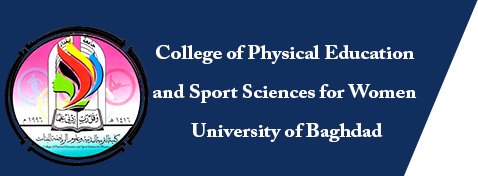Avicenna e-learning unit at the Faculty of physical education and sports sciences for girls – University of Baghdad
Avicenna e-learning unit at the Faculty of physical education and sports sciences for girls – University of Baghdad
Brief Overview of the Unit
With the spread of modern communication methods, the concept of e-learning has emerged, which refers to education using modern communication tools such as computers, the Internet, and multimedia, or distance learning, achieving the greatest benefits with minimal time and effort. The project was first initiated by the European Union and UNESCO in 2002 and was implemented from 2002 to 2006. There are different types of e-learning, including synchronous e-learning, where students and instructors are present at the same time in front of electronic screens, allowing for direct discussions through chat rooms or virtual classrooms. One of the main advantages of this type of learning is that students receive instant information, and it saves commuting time to the study location. However, it has drawbacks, as it requires modern electronic devices and a good network connection.
This unit was established at the college in 2018 based on a letter from the University of Baghdad. The following individuals have managed the unit since its establishment:
-
Prof. Dr.Noor Hatem Rida Al-Haddad Head (from 2025 to present)
Computer Technician Bashir Qusay Abdul Hamid – Member (from 2018 to present)
Vision of the Unit
The Ibn Sina Unit for E-Learning at the college aims to support faculty members and students, assisting them in developing communication and information technologies to enhance the educational services provided by the college to students and serve the community as a whole.
Tasks and Objectives of the Unit
-
Promoting the culture of e-learning.
-
Offering courses and workshops for faculty members and students.
-
Training and assisting instructors in using educational platforms.
-
Providing an electronic library.
-
Facilitating electronic testing services.
Mission of the Unit
-
Enabling direct communication between students and instructors in real-time without the need to be present in the classroom, using electronic communication tools.
-
Allowing instructors to quickly gauge students’ engagement with the educational material and their understanding of the lesson. They can also create surveys to assess how well students interact with them and their ability to communicate effectively to understand the material.
-
Enabling teachers to divide students into small groups for easier communication via audio and video to conduct experiments or discuss specific issues related to the lesson.
Brief Overview of the Unit
With the spread of modern communication methods, the concept of e-learning has emerged, which refers to education using modern communication tools such as computers, the Internet, and multimedia, or distance learning, achieving the greatest benefits with minimal time and effort. The project was first initiated by the European Union and UNESCO in 2002 and was implemented from 2002 to 2006. There are different types of e-learning, including synchronous e-learning, where students and instructors are present at the same time in front of electronic screens, allowing for direct discussions through chat rooms or virtual classrooms. One of the main advantages of this type of learning is that students receive instant information, and it saves commuting time to the study location. However, it has drawbacks, as it requires modern electronic devices and a good network connection.
This unit was established at the college in 2018 based on a letter from the University of Baghdad. The following individuals have managed the unit since its establishment:
-
-
Prof. Dr.Noor Hatem Rida Al-Haddad Head (from 2025 to present)
Computer Technician Bashir Qusay Abdul Hamid – Member (from 2018 to present)
-
Vision of the Unit
The Ibn Sina Unit for E-Learning at the college aims to support faculty members and students, assisting them in developing communication and information technologies to enhance the educational services provided by the college to students and serve the community as a whole.
Tasks and Objectives of the Unit
-
Promoting the culture of e-learning.
-
Offering courses and workshops for faculty members and students.
-
Training and assisting instructors in using educational platforms.
-
Providing an electronic library.
-
Facilitating electronic testing services.
Mission of the Unit
-
Enabling direct communication between students and instructors in real-time without the need to be present in the classroom, using electronic communication tools.
-
Allowing instructors to quickly gauge students’ engagement with the educational material and their understanding of the lesson. They can also create surveys to assess how well students interact with them and their ability to communicate effectively to understand the material.
-
Enabling teachers to divide students into small groups for easier communication via audio and video to conduct experiments or discuss specific issues related to the lesson.
